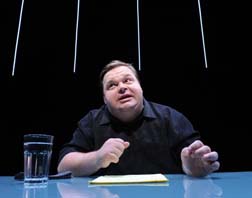By Lucy Komisar
It has been reported today, March 17, that Mike Daisey made up many of the details in his monologue about Apple and the workers who make its electronics at the huge Chinese factory, Foxconn, described in the review below. Some of those facts about dangerous working conditions are true, but not as he said them.
He described meeting workers poisoned with hexane. In fact, such a problem occurred at a factory 1,000 miles away. There have been under-age workers at some Apple suppliers, but he didn’t meet a gaggle of them at Foxconn.
His interpreter was reached by another reporter, Rob Schmitz, China correspondent for the radio show Marketplace, and she denied that Daisey met 13-year-old workers or a man with a mangled hand. Daisey’s response was that he is not a journalist. He is also not a credible raconteur.
Here is the statement by This American Life retracting its radio broadcast of Daisey’s monologue.
Here is a New York Times piece reporting independently on Foxconn workers’ situation.
Here is my original review, the facts of which must now be taken perhaps as a composite and certainly not as he told them.
* * *
This is a powerful one-man show that fits right into the ethic of Occupy Wall Street. The world’s most profitable corporation exploits workers to the point of destroying their hands and driving them to suicide. But the corporation doesn’t care. Any company you might have heard of? And can you make a play about this?

Yes, it’s Apple, which makes a 60-percent profit on every item it sells, which has a $100 billion cash on hand, more than the U.S. GDP, and which treats workers in the Shenzhen factory that produces its electronics as little more than slaves. Mike Daisey has put together a gripping monologue on this horrific reality which he delivers like a stand-up comic, except that he is sitting down. His style is shouty. Behind him are lights that occasionally zip like neon signs, perhaps to represent computers working.
Daisey establishes his bona fides as a geek who loves technology, especially Apple’s. He had the first Apple computer ever made. And he follows Apple corporate developments and products as assiduously as any business reporter. In fact, he goes on a bit too long establishing that he is a fanatical Apple aficionado.
But then he gets to his visit to the Shenzhen. A fishing village 31 years ago, it was turned into a special economic zone to deal with western corporations. It’s where virtually all computer equipment is made. Foxconn, the largest company there, has 430,000 workers who make 50 percent of all the electronics in the world.
So into the belly of the beast, with his translator and fixer Cathy, goes Mike Daisey. In a Hawaiian shirt covering his rotund body. And here’s how he got the story.

Daisey stands outside the Foxconn plant gate and talks to workers forced to toil 12 or 14 or 16 hours a day. He says, While I’m in the country, a worker at Foxconn dies after working a thirty-four-hour shift. He learns that workers are fired and put on blacklists if they ask for overtime pay.
In the first two hours he is outside the plant, he meets workers 12, 13, and 14 years old. He is told that when outside inspectors arrive, plant officials remove the youngest workers.
He quips, You’d think someone would notice this, you know? You’d think someone would say, ‘My god, you guys are amazing! I can’t believe you keep up with our BRUTAL iPhone quotas and your median age is…ahhhh…74! Chinese productivity, am I right? We gotta get some of you guys back home to Cupertino!’ That’s where Apple is located.
Conditions are so horrific, that there is an epidemic of suicides. He says, Day after day, week after week, worker after worker is climbing all the way up to the tops of these enormous buildings and then throwing themselves off, killing themselves in a brutal and public manner, not thinking very much about just how bad this makes Foxconn look. Foxconn’s response to month after month of suicides has been to put up these nets. I think it’s Foxconn’s version of corporate responsibility.
He has a clandestine meeting with people from secret unions, secret because in China, he notes, if you are caught being a member of or affiliating with a union, you go to prison for many years.
One group is talking about hexane, an iPhone screen cleaner which evaporates a little bit faster than alcohol, which means Foxconn can run the production line faster to keep up with electronics company quotas. The problem, Daisey learns, is that hexane is a potent neurotoxin, and all these people have been exposed. Their hands shake uncontrollably; some of them can’t even pick up a glass.
He says, I talk to people whose joints in their hands have disintegrated from working on the line, doing the same motion hundreds and hundreds of thousands of times. It’s like carpal tunnel on a scale we can scarcely imagine. And you need to know that this is eminently avoidable: if these people were rotated monthly on their jobs this would not happen–but that would require someone to care. At Apple or Samsung or other foreign customers.
By the time workers are 26 or 7, their hands are ruined. He says, And when they are truly ruined, once they will not do anything further–you know what you do with a defective part in a machine that makes machines. You throw it away. And the thing that unites all these people is that they are all the kind of people who would join a union in a place where joining a union can ruin your life.
Of course, Apple will say that Foxconn is just a supplier, but Daisey asks the audience, Do you really think Apple doesn’t know?… Do you believe they don‘t’ know or …just see what they want to see.
They always knew, says Daisey. They turned their back on their workers a long time ago. They made themselves the most profitable company in the history of the world. He reminds the audience that when you sit down in front of your laptops, when you open them up, you will see the blood welling up between the keys.
Apple CEO Steve Jobs’ reply to critics who protested about what Daisey revealed was: Mike doesn‘t appreciate the complexities of the situation.
Before his trip, reporters in Hong Kong told him, That’s not really how we usually do things in China…ah…that’s really a bad idea. But, in a flyer distributed after the show, Daisey reports that after his exposé, journalists from major media went to China and dug deeper into what he had said. [Walter Isaacson’s book on Jobs never even mentions Foxcomm!]
Petitions from a quarter of a million Apple users called for the company to treat workers ethically. Daisey said in the flyer that new Apple CEO Tim Cook says he is ‘furious’ that people would question Apple’s integrity. He urges, Ask him yourself. His email is tc***@***le.com….Ask him to work with labor rights organizations that aren’t suborned to corporate interests. Ask him to put Apple to work transforming how they treat workers, so we can be proud of them again.
The Agony and the Ecstasy of Steve Jobs. Written and performed by Mike Daisey; directed by Jean-Michele Gregory. Public Theatre, 425 Lafayette Street (off Astor Place), New York City. 212-967-7555; http://mikedaisey.com. His site includes the full script. http://www.publictheater.org/component/option,com_shows/task,view/Itemid,141/id,1043. Opened Oct 11, 2011; closes March 18, 2012.


Using Apple products really is like a toxic relationship….you hate what they do, and yet you find it hard to leave. Btw: Are other computer companies more responsible in their manufacturing of their items? Or are they all equally as horrible?
LK: According to Daisey, they’re all bad.